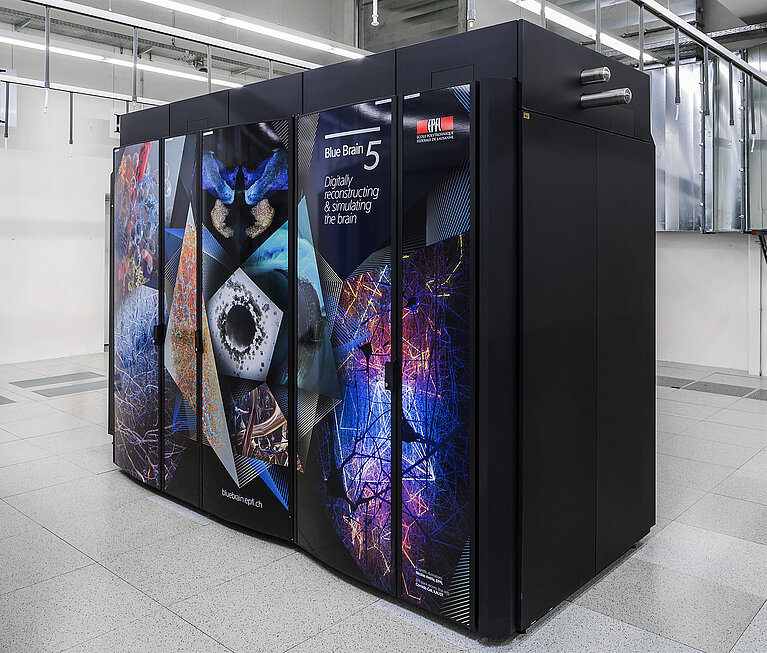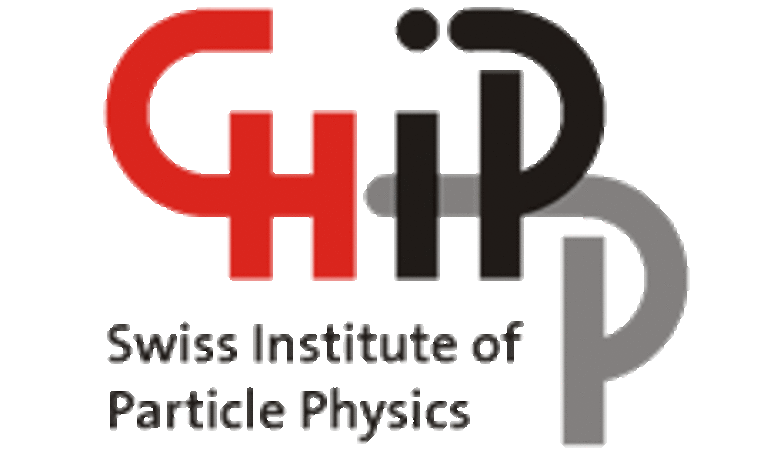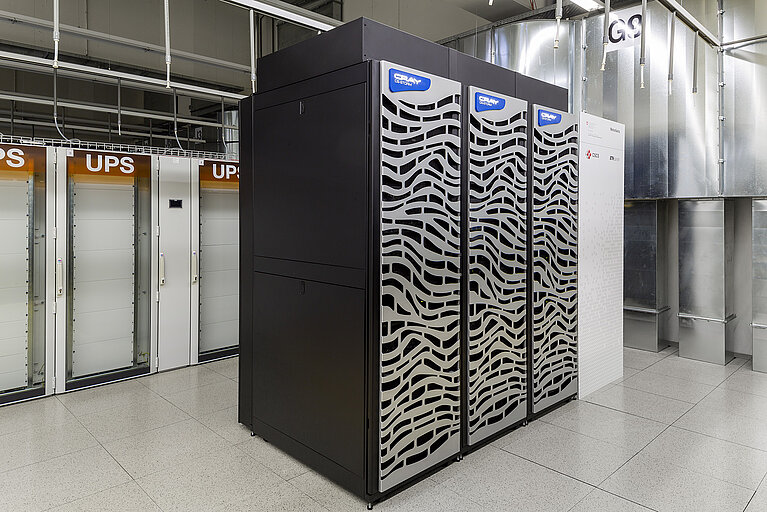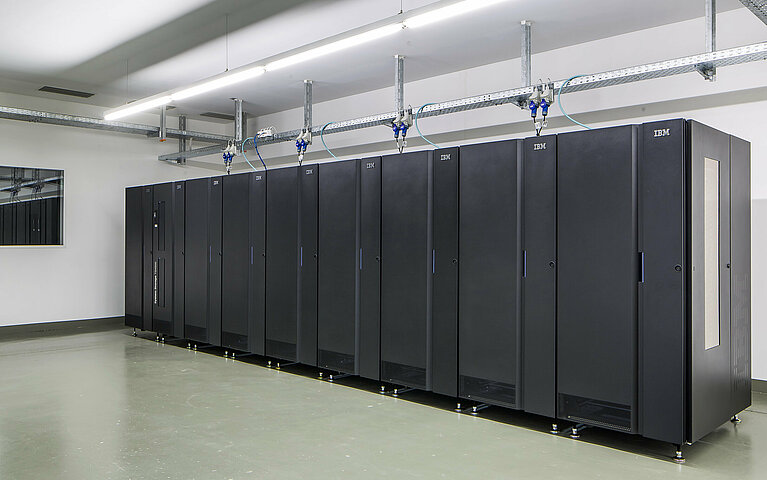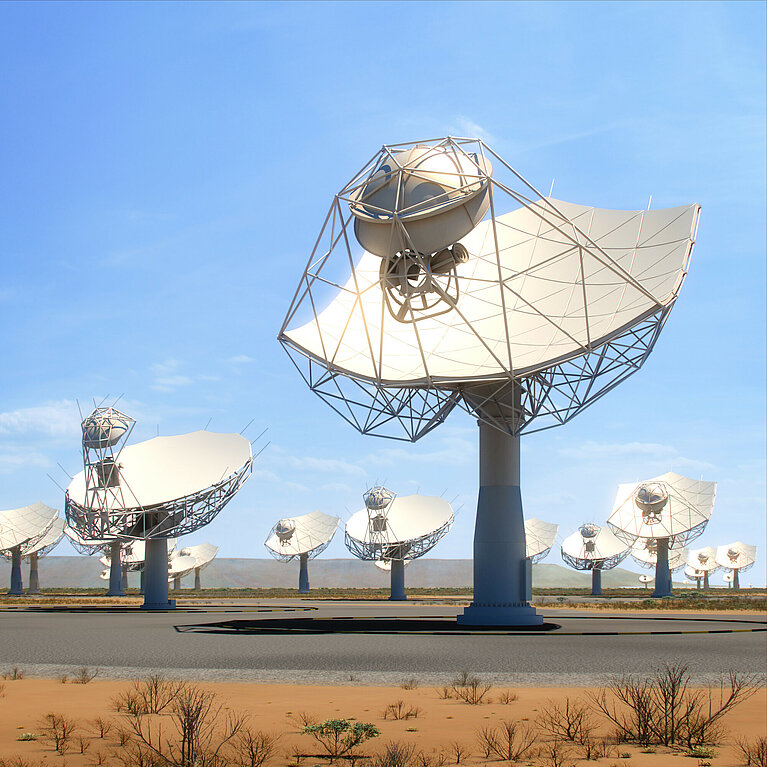With its extensive knowledge CSCS supports different institutions and projects of national significance with high computational requirements.
Examples of the services provided to contractual partners are given below.
Access to shared computational resources
A number of Swiss research institutions and universities provide their scientists with computational resources shared with the User Lab on a contractual partner basis. In this way their scientists gain access to state-of-the-art infrastructure.
The following institutions make use of this offering: Empa / Eawag, ETH Zurich, NCCR MARVEL, Paul Scherrer Institute, Swiss Data Science Centre, Università della Svizzera italiana, University of Geneva (CADMOS), University of Zurich.
Blue Brain Project – Housing of HPC Infrastructure
Reconstructing the brain piece by piece and building a virtual brain in a supercomputer—these are some of the goals of the Blue Brain Project at EPFL. The virtual brain will be an exceptional tool giving neuroscientists a new understanding of the brain and of neurological diseases.
The computing power needed is considerable: each simulated neuron requires the equivalent of a laptop computer, and a full model of the brain needs billions of these. Supercomputing technology is rapidly approaching a level where simulating the whole brain is becoming a concrete possibility.
CSCS houses the Blue Brain V supercomputer for EPFL and provides the necessary data backup infrastructure.
CHIPP - Analysis of data from the Large Hardon Collider (LHC)
The Swiss Institute of Particle Physics (CHIPP) represents the Swiss particle physics community in the context of the Large Hadron Collider (LHC) at CERN. The goal of LHC is to help understand the building blocks of our Universe by particle collisions.
On behalf of CHIPP, CSCS operates a mid-size Tier-2 grid site for three of the four detectors: ATLAS, CMS and LHCb. Challenges are the many petabytes of data transferred between CERN, CSCS and the other grid sites, and the need to coordinate activities with the other members of the community across international boundaries.
This grid site is the first in the world to be fully running with HPC resources.
MARVEL – Compute and long-term storage resources
MARVEL (a National Centre of Competence in Research - NCCR) aims to radically transform and accelerate the design and discovery of novel materials. This is being achieved thanks to the powerful synergies arising with the computer science of heterogeneous data management, data mining, and machine learning.
CSCS supports MARVEL by providing compute and long-term storage resources, and the two organizations work closely together in defining the Materials Platform of the future.
MeteoSwiss - Numerical Weather Forecasts
MeteoSwiss computes its daily weather forecasts on two CSCS supercomputers (Tsa and Arolla). Weather forecasts are important not only for informing the public of future weather conditions and possible natural hazards – they also provide information that is essential for air traffic control services and disaster mitigation (for example, if there is a radioactive leak at a nuclear power station and we need to assess how far the radioactive cloud will spread).
The movie here, provided by MeteoSwiss, shows a visualization of the high resolution regional weather model (COSMO-1) developed by MeteoSwiss and running at CSCS - with simulated cloud coverage over a mosaic of satellite images. For additional information about the contents of the movie please refer to the information provided on Youtube.
Paul Scherrer Institute - Archiving of scientific data
The Paul Scherrer Institute (PSI) is the largest research centre for natural and engineering sciences within Switzerland. The institute performs world-class research in three main subject areas: matter and material; energy and the environment; and human health. By conducting fundamental and applied research, it works on long-term solutions for major challenges facing society, industry and science.
PSI operates large scale research facilities and conducts research that produce a large amount of data that has to be archived and made available on demand to researchers. CSCS provides PSI with a dedicated archiving system for scientific data – for the SwissFEL experiment in particular.
SKA and CTA - Big Data in Astronomy
Shaping the future of Astronomy at Petabyte-to-Exabyte scales is of strategic importance for Switzerland to support research, education and innovation. The Cherenkov Telescope Array (CTA) and the Square Kilometer Array (SKA) Observatories are at the forefront of this new Big Data astronomy. These observatories are being built now and together they will generate close to 1 Exabyte per year, to be distributed around the globe.
- Square Kilometer Array Observatory: Two telescopes are under construction, one in South Africa and one in Australia. These installations will combine the signals received from thousands of small antennae spread over a distance of several thousand kilometers to simulate a single giant radio telescope capable of extremely high sensitivity and angular resolution. CSCS, as part of the Swiss Consortium lead by EPFL, will host part of the data coming from SKAO and its corresponding data analysis and simulations.
- Cherenkov Telescope Array Observatory: The two telescopes that are being built in both La Palma and Chile are the next generation of gamma-ray astronomy research with a leading role worldwide in multi-wavelength and multi-messenger studies of the Universe. CTAO has the potential to unravel the sources of cosmic rays, the charged particles that continuously bombard our atmosphere up to energies well beyond those achievable by any possible accelerator on Earth. CSCS is one of the four off-site data centers in collaboration with the Swiss Consortium lead by UniGE.
